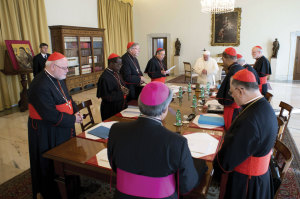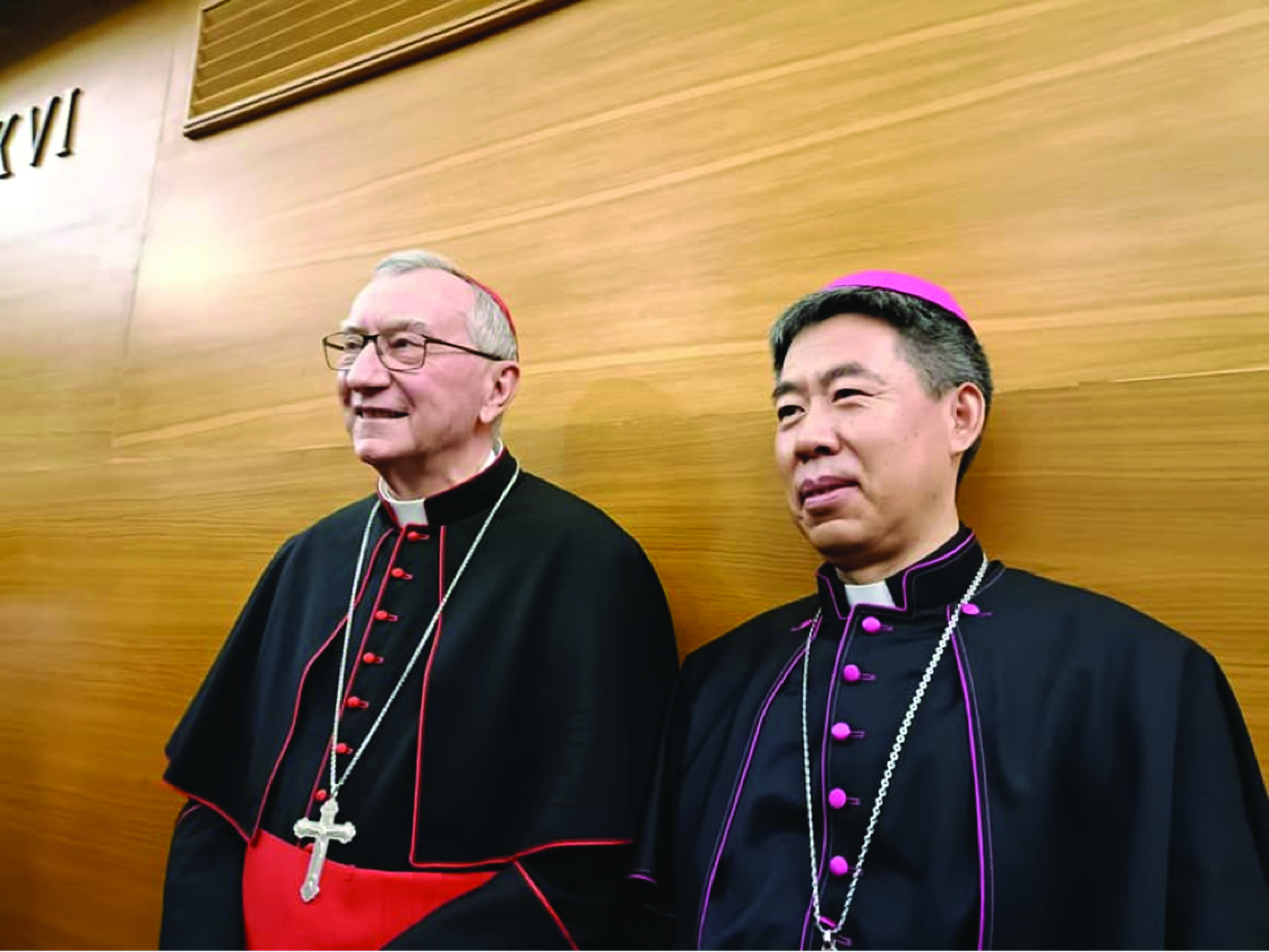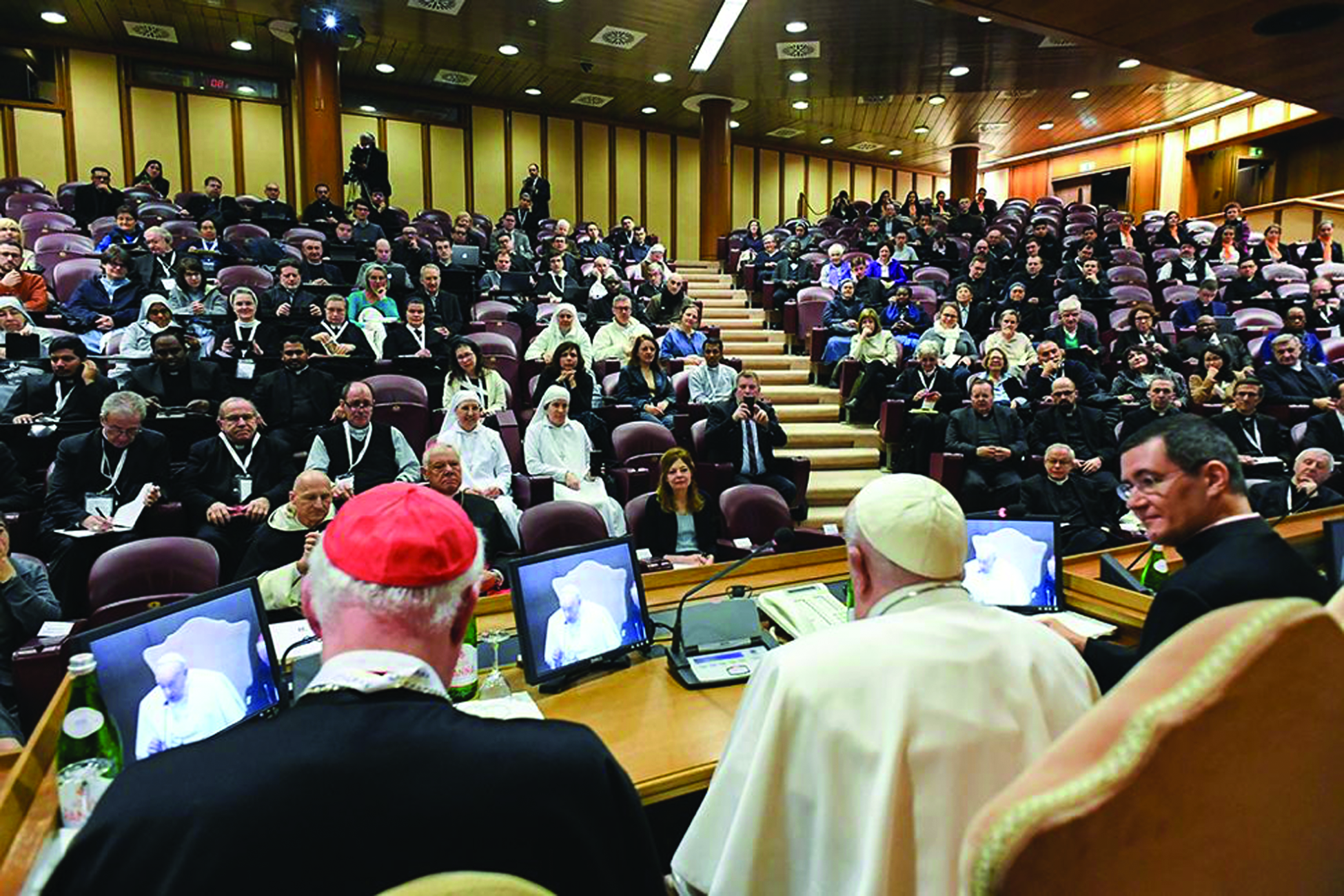
Pope Francis prays during a meeting with cardinals at the Vatican October 1. As a series of consultations aimed at the reform of the Vatican bureaucracy began, the pontiff told his group of cardinal advisers that humility and service attract people to the Church, not power and pride.
Several Curial offices will be merged, observers say, and in this way, the work of the Curia will be streamlined. Decisions are expected soon…
As reported on La Croix and echoed on Periodista Digital, the Pope summoned the heads of Curial dicasteries to a meeting on Monday, November 24, where the second phase of Curial reform was discussed. Apparently this phase will consist of the consolidation of at least some of the Pontifical Councils. (The first phase is the reshaping of the Holy See’s economic and financial services, whose most significant chapter so far has been the establishment of the “Secretariat for the Economy” now headed by Cardinal Pell.)
The proposal marked for discussion was to see four Pontifical Councils — Justice and Peace, Cor Unum, Pastoral Care of Migrants and Itinerants, and Pastoral Care of Health Workers — being merged into one body with the name “Charity and Justice.” Two other Councils — the Pontifical Council for the Family, and for the Laity — would be merged into a single body.
A third body would be formed to coordinate all the organs of communication of the Holy See — Radio Vaticana, L’Osservatore Romano, Pontifical Council for Social Communications and perhaps others. The reports say nothing about the five remaining Pontifical Councils: 1) Promotion of Christian Unity, 2) Interpretation of Legislative Texts, 3) New Evangelization, 4) Interreligious Dialogue, 5) Culture. This is not to say that these bodies will certainly remain as they are. (Some will recall that under Pope Benedict XVI the Councils for Culture and Interreligious Dialogue were merged under the same president from 2006 to 2007.)
So far there is no mention of consolidations among the nine existing Congregations of the Roman Curia (Doctrine of the Faith, Divine Worship, Causes of Saints, Bishops, Clergy, Institutes of Consecrated Life and Societies of Apostolic Life, Catholic Education, Eastern Churches, and Evangelization of Peoples).
Periodista Digital also had another report with more details of the proposed merger of the Pontifical Councils for the Family and for the Laity. It is proposed that the new body will become a full Congregation with five sections: Laity, Family, Women, Associations of the Faithful, and Ecclesial Movements. Among other things, the section on Laity would be headed by a layman, the section on Women would be headed by a woman (a laywoman, apparently) and the section on the Family would be headed by a married couple. They would have the rank of undersecretaries.
It will be interesting to see how the prelates who currently head the six Pontifical Councils being eyed for the mergers will be assigned once the reforms take place. Of these, Antonio Maria Cardinal Vegliò (Migrants and Itinerants) is past retirement age, being nearly 77. Another — Archbishop Vincenzo Paglia of the Pontifical Council for the Family, 69 — is identified with the liberal wing of the Curia, given his statements that there is “no going back” on reforms after the 2014 Extraordinary Synod, and his woolly statements on civil unions for homosexuals (as previously reported by Rorate).
The remainder — Archbishop Zygmunt Zimowski (Health Workers) and Cardinals Peter Turkson (Justice and Peace), Stanisław Rylko (Laity) and Robert Sarah (Cor Unum) — are all between the ages of 65 and 69 and are identified with the Ratzingerian-conservative Wojtylian line. Cardinal Rylko and Archbishop Zimowski are two of three Polish dicastery heads at present, the third one being the 75-year-old Zenon Cardinal Grocholewski, Prefect for Catholic Education. Cardinals Turkson and Sarah are the only African dicastery heads, and both were among the conservative voices at the 2014 Synod, especially Cardinal Sarah. (Editor’s note: Sarah was appointed to the Congregation for Divine Worship on Nov. 24th.)
The round of mergers that was to be discussed that day are but the second stage in the reform of the Curia: the writing of a new Apostolic Constitution to replace Pastor Bonus still lies ahead, and it is not at all ruled out that further consolidations await the Curia.






Facebook Comments